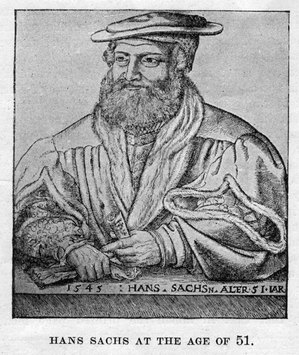When you were young did you not like to while away some idle moments watching men at work? The present writer spent many such moments in a cobbler’s shop, watching the artisan at work, cheerily chatting about the affairs of the town and State, interjecting many little nuggets of wisdom and practical philosophy.
And when he saw, for the first time, Wagner’s opera, Die Meistersinger, and watched the genial cobbler-poet and artisan-artist at work, it seemed like a picture from other days. What a noble portrait in words and music the master composer has drawn : A big body, a big mind, a big heart, devoid of affectation, filled with simplicity of thought and living.
When we read the history of music we must not lose sight of the fact that the whole development was not at the hands of the professional musician and the nobility. In many of the free cities of Germany there were men of wealth and liberal ideas, who believed in art and practiced it with pleasure and persistence. These men drew together and formed themselves into an association to promote the cause of vocal music among the people and chose the name, “Mastersingers,” for their guild.
 The center of the movement was in the wealthy city of Nuremberg, where Hans Sachs was born, November 5, 1494, about two years after the discovery of America by Christopher Columbus. He was apprenticed to a shoemaker, or, as we should say, cobbler, and after his year, or period of wandering, returned to his native city. The reader who knows the nature of this wanderjahr, which was imposed on every apprentice, can imagine the keenness with which Hans studied the different people he met, the places he visited, and can readily divine that the gifts as poet and singer which he afterward showed must have made him a welcome guest wherever he chanced to tarry.
The center of the movement was in the wealthy city of Nuremberg, where Hans Sachs was born, November 5, 1494, about two years after the discovery of America by Christopher Columbus. He was apprenticed to a shoemaker, or, as we should say, cobbler, and after his year, or period of wandering, returned to his native city. The reader who knows the nature of this wanderjahr, which was imposed on every apprentice, can imagine the keenness with which Hans studied the different people he met, the places he visited, and can readily divine that the gifts as poet and singer which he afterward showed must have made him a welcome guest wherever he chanced to tarry.He settled in Nuremberg as a shoemaker, and also gave himself up diligently to a study of the principles of the Mastersingers, his teacher being the linen weaver, Nunnenbeck. To great talent in this line he must have joined considerable industry, since, according to his own words, he wrote about 6,000 poems, of which only a small number have been printed. His writings, outside the lyrics referred to, include tragedies, comedies, carnival plays, bible, mythological and historical stories, as well as fables and farces.
He was a follower of the reformed religion as is suggested by an allegorical poem to Luther called “The Wittenberg Nightingale.” He died January 25, 1576, at Nuremberg.
[Readers who are interested in fiction will enjoy a book by Mrs. Clark, called “The Cripple of Nuremberg,” which introduces Hans Sachs as one of the leading characters. It is an excellent book for boys and girls, as well as the older folks.—The Editor.]



